EXTENSION OF REGISTRATION DEADLINE
Due to technical problems on the platform that led to a delay on the start of registrations, the registration deadline (Art. 10 and 17 of the DR 2024 notice of 25.2.2025) is extended to 4 p.m. on 12.4.2025.
RANKING LIST - FOURTH ADMISSION TEST - 28.03.2025
The candidates can register starting at 4 p.m. on tuesday 1 april 2025 and mandatorily by 4 p.m. on monday 7 april 2025.
The matriculation process is considered finalized with full payment of the first installment of tuition, registration fees, regional fee and stamp duty.
MODALITY OF IMPLEMENTATION OF THE ADMISSION TEST
The admission test for the Healthcare Professions Courses for the academic year 2024/2025, provided for in the call issued by R.D. n. 2024, will take place on 28.3.2025. The candidates are convocated at 10.00 a.m. and the test will begin at ore 10.30 a.m.
BRANCH:
-
For candidates who have chosen to take the test at the Rome branch:
Link Campus University, via del Casale di San Pio V, 44 (near Piazza di Villa Carpegna) Ancient Library
(Free parking is available on site) -
For candidates who have chosen to take the test at the Città di Castello branch:
Link Campus University, via Carlo Marx, 20 – Classroom 1
(Free parking is available on site)
For the academic year 2024-2025, enrolment in the Degree courses in the healthcare professions with programmed access, listed in the table below, is subject to passing an admission test.
| n. | Class | Course | Branch |
Places EU |
Places extra EU |
|---|---|---|---|---|---|
| L05 | L/SNT1 | Nursing (qualifying for the healthcare profession of Nurse)* | Città di Castello – ASL n. 1 Umbria | 90 | 10 |
| L06 | L/SNT2 | Physiotherapy (qualifying for the healthcare profession of Physiotherapist)* | Città di Castello – ASL n. 1 Umbria | 65 | 10 |
| L07 | L/SNT4 | Osteopathy (qualifying for the healthcare profession of Osteopath)* | Rome Ospedale San Pietro via Cassia | 65 | 10 |
| L08 | L/SNT4 | Osteopathy (qualifying for the healthcare profession of Osteopath)* | Città di Castello – ASL n. 1 Umbria | 65 | 10 |
The admission test for the degree courses in the healthcare professions is identical for access to all the types of courses activated at the same university and during the test the candidate must proceed to enter, on the personal data sheet, the choice of courses and the relative location, in order of preference, up to a maximum of 4 options, one of which is compulsory.
The choice of at least one degree course is compulsory, if the candidate does not make any choice they will be excluded from the evaluation and consequently from any ranking list.
In the event of any of these scenarios occurring, the University will issue a special notice to make the remaining places available to candidates who have taken the test at other universities and were unable to matriculate due to a shortage of places.
*Territorial tax incentives
The University provides for important territorial tax incentives for students enroled in courses at the Città di Castello branch of the University and resident in:
- Città di Castello: 30% discount on the tuition fee
- province of Perugia and Arezzo: 20% discount on the tuition fee
- regions of Umbria, Tuscany and Marche: 10% discount on the tuition fee
Admission test date
The admission test will be held on 28/03/2025 at both the Rome and Città di Castello (PG) branches of Link Campus University.
The locations for the admission test will be determined on the basis of the number of applications received and may also be located outside the venues of the university.
The time when candidates will be convened the locations of the test will be published by 24/03/2025.
Submission of the application for the admission test
Registration for the admission test must be carried out within 4 p.m. on 28/2/2025 and must be completed by 4 p.m. on 24 March 2025, along with the payment of the test fee.
During the registration phase, in addition to entering all the data required by the procedure, the candidate must specify the location chosen for the test, provide consent to the processing of personal data and acknowledge having read the present Call.
Test topics and admission criteria
The candidate must proceed to enter, on the personal data sheet, the choice of courses and their location, in order of preference, up to a maximum of 4 options, one of which is compulsory.
The admission test consists of a written multiple-choice test presenting five answer options, from which the candidate must identify only one, discarding any incorrect, arbitrary or less likely conclusions. It consists in 60 questions in Italian on the basis of the syllabuses provided for in Attachment A and distributed as follows:
- 4 questions of reading skills and knowledge acquired throughout the studies
- 5 questions of logical reasoning and problems
- 23 questions of biology
- 15 questions of chemistry
- 13 questions in physics and mathematics
The admission test will last 100 minutes.
Ranking and publication of results and procedure for managing takeovers
By 1 April 2025, the general merit list will be published anonymously using the candidate's pre-registration number, as well as the individual course rankings, also anonymously.
After publication, the boxes of the biographical data sheets will be opened in public session to allow the candidate code and biographical data to be matched.
For applicants from non-EU countries living abroad, an autonomous general ranking list and autonomous individual course rankings are established by the University.
Candidates placed in a useful position in the individual course rankings are admitted to the course and may therefore proceed with the enrolment.
The deadline for registration is 4 p.m. on 7 April 2025.
Each candidate will be included in all rankings for the chosen courses.
The candidates may only enrol in the course for which they are eligible; if they are eligible for more than one ranking list, they may only enrol in the course for which they have expressed the highest order of preference.
Candidates who do not register by 4 p.m. on 7 April 2025 will be considered withdrawn.
Enrolment requirements
Enrolment is finalised upon payment in full of the first instalment of the tuition fee, registration fee, regional tax and stamp duty.
Failure to complete enrolment by the deadline referred to in the previous article shall entail the renunciation of enrolment and shall result in the rankings being reversed.
Summary table of deadlines and privacy notice
| Activity | date | See Article Notice |
|---|---|---|
| Registration application |
From 4.00 p.m. on 28.2.2025 to 4.00 p.m. on 24.3.2025 |
Article 4 |
| Publication of candidate convocation time and test location | 24.3.2025 | Article 3 |
| Implementation of the admission test | 28.3.2025 | Article 3 |
| Publication of the ranking list | Within 1.4.2025 | Article 10 |
| Deadline for matriculation candidates | Ore 16 del 7.4.20255 | Article 10 |
| Publication 1° take-over | Entro 9.4.2025 | Article 10 |
| Request for change of course to better choice | Within 12.00 on 12.4.2025 | Article 10 |
| Payment of any tuition fee | Within 12.00 on 12.4.2025 | Article 10 |
| Deadline for registration of first take-over candidates | Within 12.00 on 12.4.2025 | Article 10 |
| Payment of the 2nd instalment | 7.05.2025 | Article 11 |
| Payment of the 3rd instalment | 9.06.2025 | Article 11 |
| Payment of the 4th instalment | 8.07.2025 | Article 11 |
The course of study in Physiotherapy provides the scientific basis and theoretical-practical preparation necessary to be qualified to practise as a Physiotherapist.
The Degree Course in Physiotherapy lasts 3 years and is divided into 6 semesters; the first year is propaedeutic, the second is devoted to the study of pathologies subject to rehabilitation treatment and the Rehabilitation Sciences, and the third is vocational and specialized.
The learning pathway provides for basic, characterizing and related educational activities; it also provides for further specific professionalizing educational activities such as seminars, internships, partly compulsory, partly freely chosen by the student.
the learning pathway provides for training activities such as workshops, preparatory to internship activities.
The theoretical and practical training activities carried out in the work context are aimed at the maturation of specific professional skills, but also envisage the acquisition of behavioural skills such as to ensure, at the end of the training course, the full mastery of all the necessary competences and their immediate employability in the work environment.
he candidates will be provided with an adequate preparation in the basic disciplines, in order to enable them to better understand the most relevant elements underlying both pathological processes and recovery processes, on which their rehabilitation and/or therapeutic intervention in childhood, adulthood and geriatric age will focus. The graduates will be able to treat patients for a large number of pathologies, define their relevant rehabilitation programmes, and identify the most suitable physiotherapy/rehabilitation intervention using not only specific physiotherapy techniques or modalities, but also relational educational components.
With the increase in the average age of the general population, rehabilitation functions are the subject of pressing demands from the territory and rehabilitation facilities, which allows graduates of this class to find important job opportunities in public and private facilities where they will have the opportunity to work in multidisciplinary teams.
CAREER OPPORTUNITIES
The students graduated in Physiotherapy will be able to find employment in public or private health and social-welfare facilities, either as an employee or freelance professional. In particular, occupational outlets can be identified in any field where prevention, treatment and rehabilitation interventions are required in the areas of motor, upper cortical and visceral functions resulting from pathological events of various aetiologies, whether congenital or acquired.
The students graduated in Physiotheropy perform their activities in physiotherapy and rehabilitation services within the National and Regional Health Service, private facilities accredited and affiliated with the National Health Service, research institutes, nursing homes, clinics, foundations, rehabilitation facilities and centres, nursing homes, patients' homes, spas and wellness centres, medical and/or multi-specialist surgeries. The current regulations allow for freelance activities in individual or associated professional firms, sports associations and clubs of various types, service cooperatives, non-governmental organisations (NGOs), and public or private prevention services.
![]() Download the Educational Offer - Bachelor's Degree Course in Physiotherapy (L/SNT2) - a. y. 2024/2024
Download the Educational Offer - Bachelor's Degree Course in Physiotherapy (L/SNT2) - a. y. 2024/2024
Learning Pathway - Physiotherapy (L/SNT2)
First Year
|
Subject |
CFU |
SSD |
|
1st Semester |
||
|
Anatomo-physiological bases of the human body Human anatomy Physiology Histology |
3 3 1 |
BIO/16 BIO/09 BIO/17 |
|
Molecular basis of life Biochemistry Applied biology Applied physics Medical genetics |
2 1 2 1 |
BIO/10 BIO/13 FIS/07 MED/03 |
|
Socio-psycho-pedagogical sciences Logic and philosophy of science General and social pedagogy General psychology General sociology |
1 2 2 1 |
M-FIL/02 M-PED/01 M-PSI/01 SPS/07 |
|
2nd Semester |
||
|
Pathophysiological bases of diseases Pathological anatomy Microbiology and clinical microbiology Clinical pathology General pathology |
1 2 1 1 |
MED/08 MED/07 MED/05 MED/04 |
|
General methodology of rehabilitation Physical and rehabilitation medicine Experimental pedagogy Technical and rehabilitation nursing sciences |
3 1 4 |
MED/34 M-PED/04 MED/48 |
|
Health promotion and safety Diagnostic Imaging and Radiation Protection 1 Diagnostic Imaging and Radiation Protection 2 Infectious diseases Neuropsychiatric and rehabilitation nursing and techniques |
1 1 2 2 |
MED/36 MED/36 MED/17 MED/48 |
|
Knowledge of at least one foreign language |
3 |
|
|
Physiotherapy - Internship I |
14 |
|
Second Year
|
1st Semester |
||
|
Rehabilitation in the neurological area Neurology Clinical psychology Technical and rehabilitation nursing sciences |
2 2 2 |
MED/26 M-PSI/08 MED/48 |
|
Rehabilitation in the neurotrauma area Neurosurgery Neuroradiology Nursing sciences and neuropsychiatric and rehabilitation techniques Applied medical technical sciences |
2 2 1 1 |
MED/27 MED/37 MED/48 MED/50 |
|
Rehabilitation in the orthopedic and trauma area Diseases of the locomotor system Physical and rehabilitation medicine Rheumatology Technical and rehabilitation nursing sciences |
2 2 1 2 |
MED/33 MED/34 MED/16 MED/48 |
2nd Semester |
|
Healthcare management bioethics and deontology History of Medicine Forensic medicine Technical and rehabilitation nursing sciences Business Management Business Organization |
1 1 1 1 1 |
MED/02 MED/43 MED/48 SECS-P/07 SECS-P/10 |
|
Rehabilitation in the geriatric area Internal medicine Neurology Technical and rehabilitation nursing sciences |
2 2 2 |
MED/09 MED/26 MED/48 |
|
Rehabilitation in the pediatric area Child Neuropsychiatry Pediatrics Technical and rehabilitation nursing sciences |
2 2 1 |
MED/39 MED/38 MED/48 |
|
Annual Activities |
||
|
Pisiotherapy - Internship II |
21 |
|
Third Year
|
1st Semester |
||
|
Basics of emergency and first aid in rehabilitation Anaesthesiology General Surgery 1 General Surgery 2 Technical and rehabilitation nursing sciences |
2 1 1 2 |
MED/41 MED/18 MED/18 MED/48 |
|
Rehabilitation in the cardio respiratory area Cardiac surgery Thoracic surgery Cardiovascular diseases Respiratory diseases Technical and rehabilitation nursing sciences |
1 1 1 2 2 |
MED/23 MED/21 MED/11 MED/10 MED/48 |
|
2nd Semester |
||
|
Evidence-based rehabilitation General and applied hygiene Computer Science 1 Computer Science 2 Technical and rehabilitation nursing sciences Medical Stastistics |
1 1 1 2 2 |
MED/42 INF/01 INF/01 MED/48 MED/01 |
|
Rehabilitation in specialized area Medical Oncology Technical and rehabilitation nursing sciences Urology |
2 1 2 |
MED/06 MED/48 MED/24 |
|
Annual Activities |
||
|
Physiotherapy - Internship III |
25 |
|
|
ADE |
6 |
|
|
Seminars/p> |
4 |
|
|
Professional Workshops |
3 |
|
|
Final Dissertation |
6 |
|
ADMINISTRATION OFFICES
STUDENT ADMINISTRATION OFFICE
Email: sanitarie.segreteria@unilink.it
Tel: +39 06 3400 6000
TEACHING OFFICE
Palazzina Romagnoli - 1st Floor
Office Hours
Monday - Wednesday - Friday: 10.00 - 13.00
Tuesday - Thursday: 14.30 - 16.30
Email: segreteria.docenti@unilink.it
Tel: +39 06 3400 6000
ADMISSION REQUIREMENTS
In order to be admitted to the Bachelor's Degree in Physiotherapy, the candidates must have attained an upper secondary school diploma or another qualification obtained abroad and recognised as suitable. The prerequisites required of students aiming to enrol in the course should include good human contact skills, good teamwork skills, and the ability to analyze and solve problems.
Admission to the course is subject to a programmed number of students in accordance with law n. 264/99 and provides for an admission exam consisting in a test with multiple-choice answers. The student's initial preparation is assessed through the administration of an entrance test, common to all the Department's Health Area Degree Courses, consisting of multiple-choice questions on topics of logic and general culture, chemistry, biology, physics and mathematics. The knowledge required for admission, defined annually by the Ministry of Education, is verified by achieving a minimum score in the admission test. Students admitted to the course with a level below the minimum pre-set assessment (at least 40% correct answers in the disciplines of biology, chemistry, physics and mathematics) will be assigned additional training obligations (OFA) to be made up within the first year of the course.
For the purpose of allowing the annullment of eventual educational obligations personalised remedial plans will be activated under the responsibility of the teachers in the relevant disciplines. Educational obligations are deemed to have been met by passing the relevant exam. The procedures are governed by the didactic regulations of the Degree Course.
FINAL EXAMINATION
In order to be admitted to the final examination (degree examination), the student must have passed all the examinations, have carried out all the internships and passed all the related examinations.
Per il conseguimento della Laurea lo studente deve superare una prova finale che si compone di:
The final dissertation, includes:
- a practical test in which the students must demonstrate that they have acquired the theoretical-practical and technical-operational knowledge and skills pertaining to the specific professional profile;
- the drafting of a final dissertation, under the guidance of a supervising professor. The dissertation, on topics or disciplines closely related to the professional profile, may have a research, technical-application or compilation profile. A student who fails the practical test cannot be admitted to the dissertation.
Both phases of the final examination will take place in front of a Commission composed in accordance with the Regulations and the Faculty and Degree Course Teaching Regulations. The Degree examination is valid as a state exam qualifying for the profession. The final examination is organised in two nationally defined sessions.
The modality of implementation of the final examination and its timing are defined in the academic calendar, published on the University website and communicated by the Student Administration Office. For further information, please consult the following link: https://www.unilink.it/en/students/final-dissertation
GUIDELINES FOR THE ACCESS TO THE ADMISSION PROCEDURE
FIRST PHASE: REGISTRATION TO THE PORTAL
![]() Guidelines - Registration to the Portal
Guidelines - Registration to the Portal
STEP 1 - Click on the "Register" button at the top right.
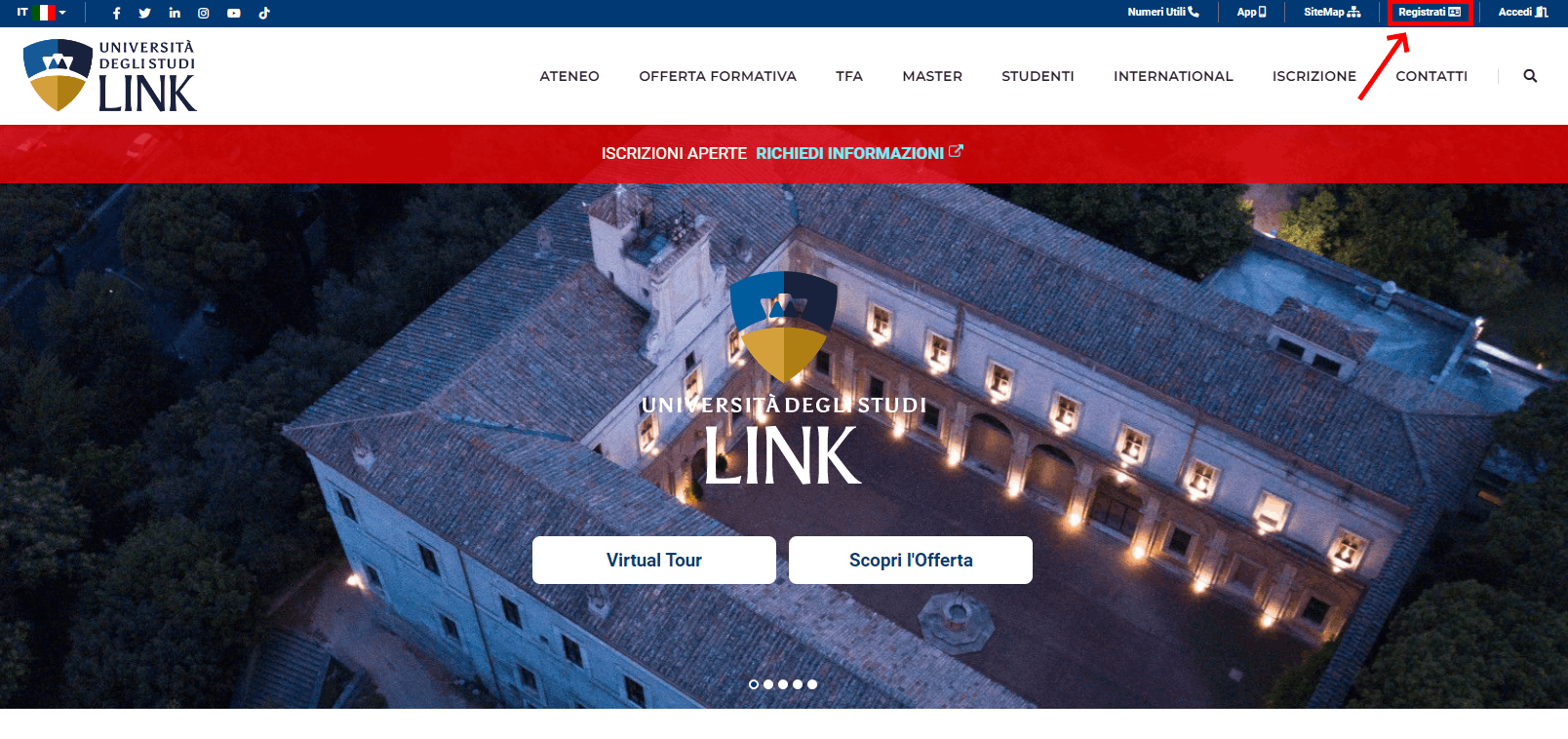
STEP 2 - Click on the "Web Registration" button.
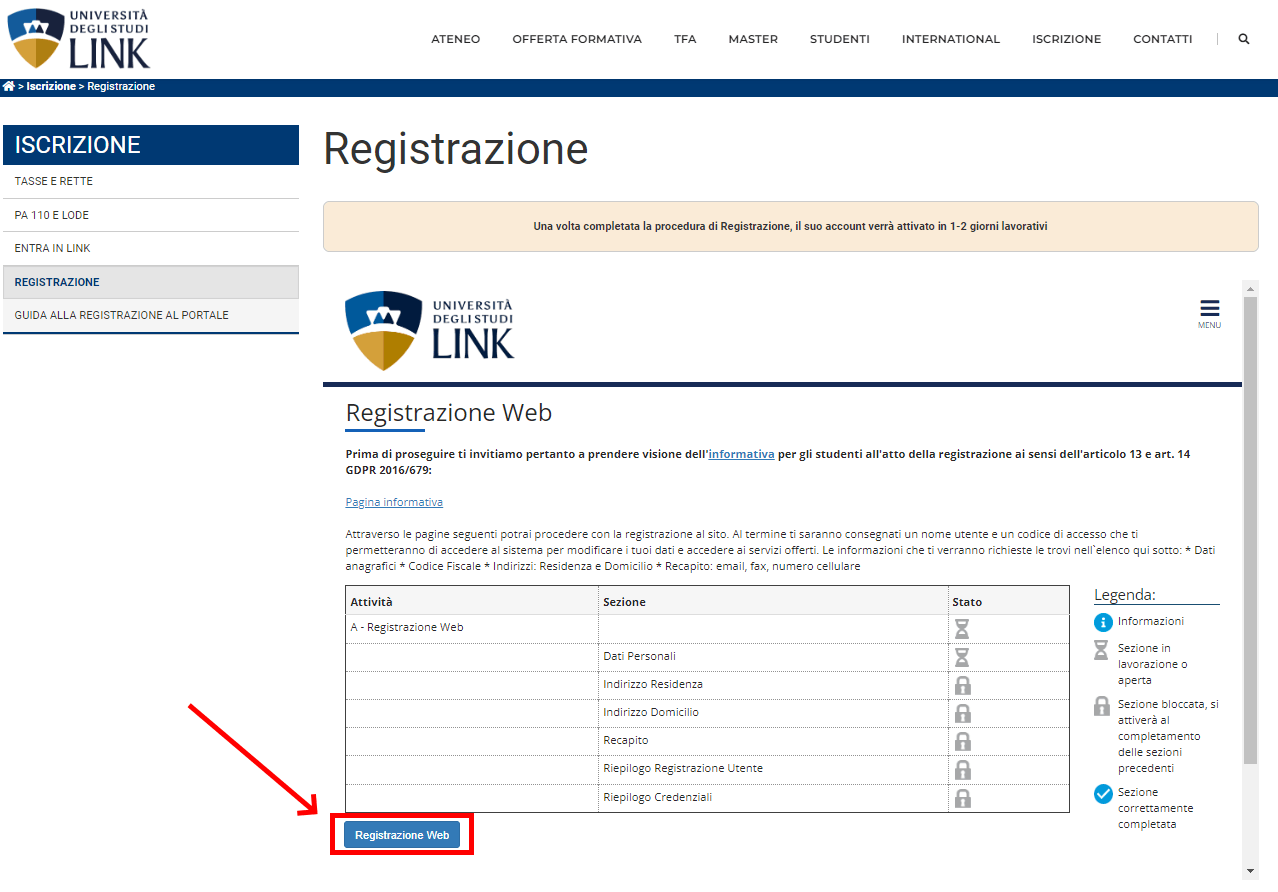
STEP 3 - Fill in the module in its entirety, then click on the "Next" button.
ATTENTION: please verify your tax code, because in case of error the user cannot be registered correctly.
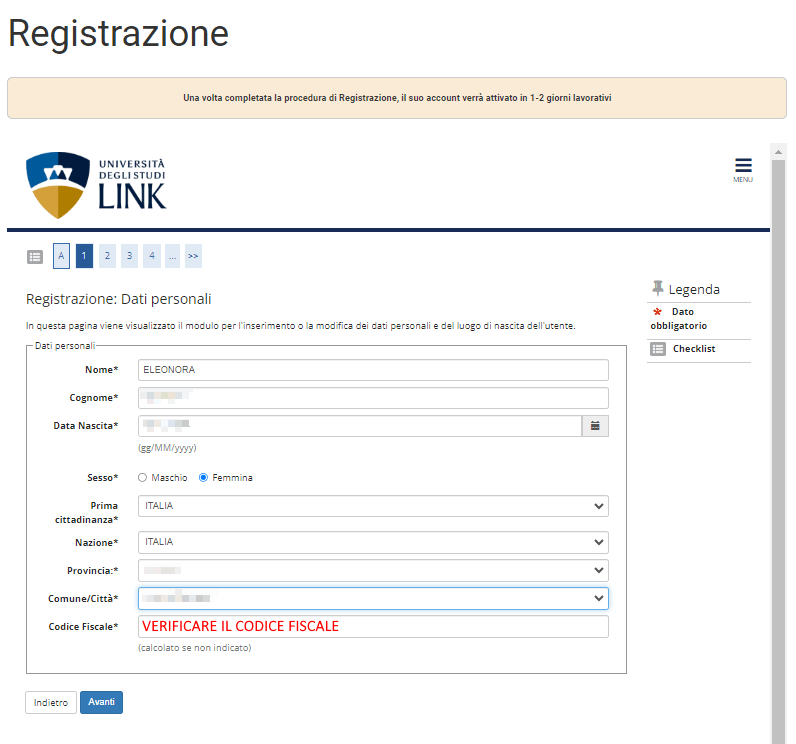
STEP 4 - Fill in the following form with the address of residence as stated in the title of the present section, then click on the "Next" button.
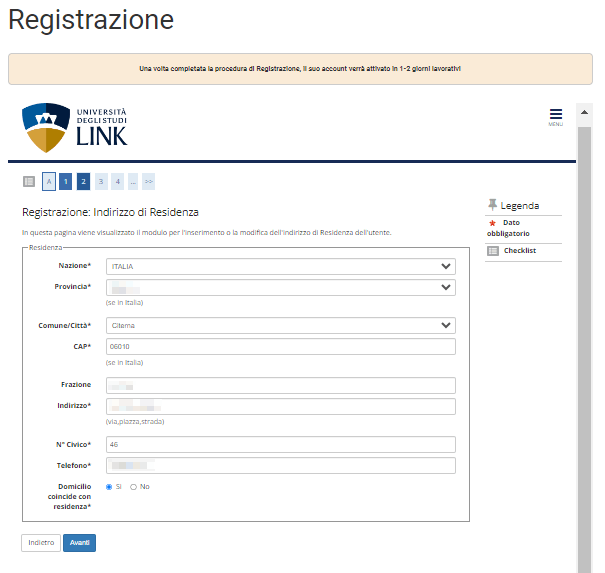
STEP 5 - Fill in the form related to the contact details only on the fields marked with an asterisk, in the "international prefix" field if you are in Italy, use 0039 as shown in the figure. Then click on the "Next" button.
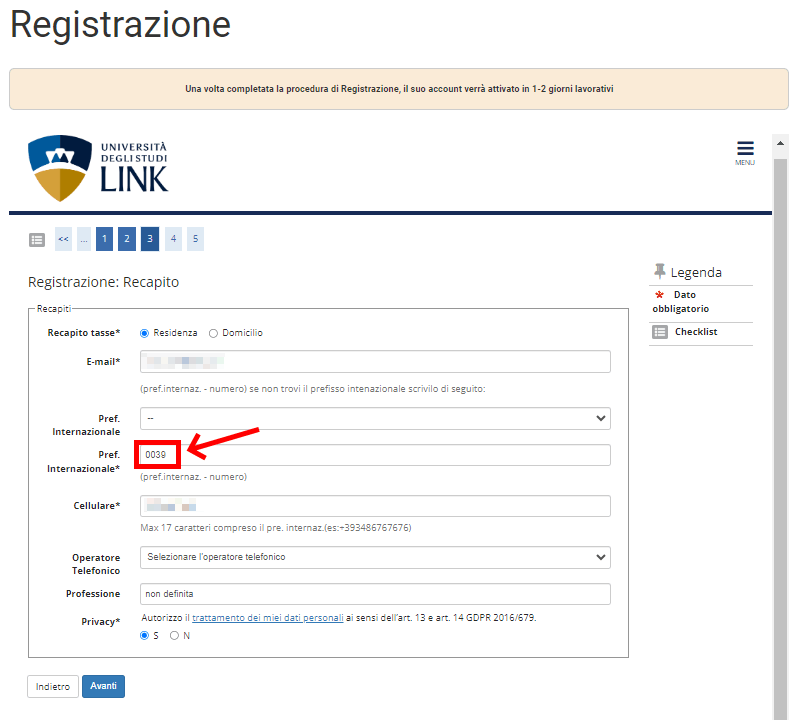
STEP 6 - You will now visualize the summary screen. Verify the correctness of the data and click on the "Confirm" button.
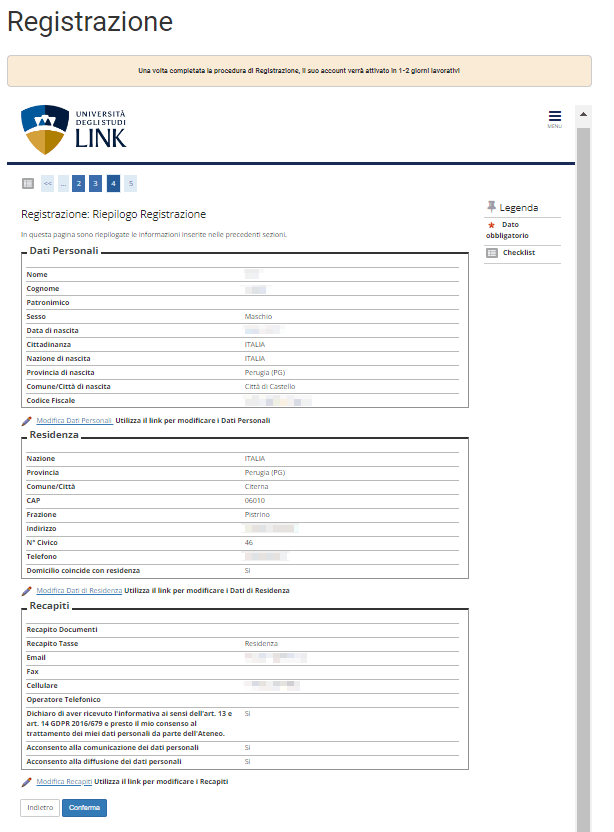
STEP 7 - At the end of the registration process you will receive the login credentials.
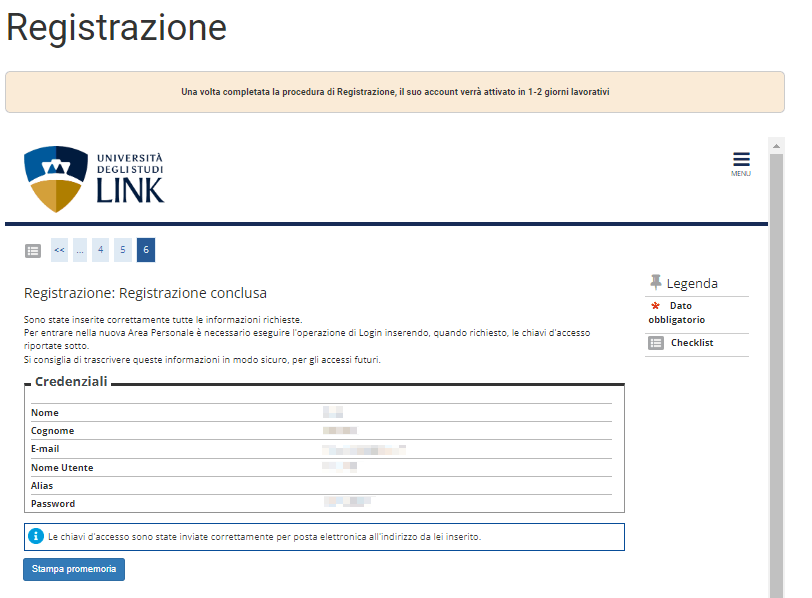
STEP 8 - Return to the Home of the portal and click on the "Access" button on the top right.
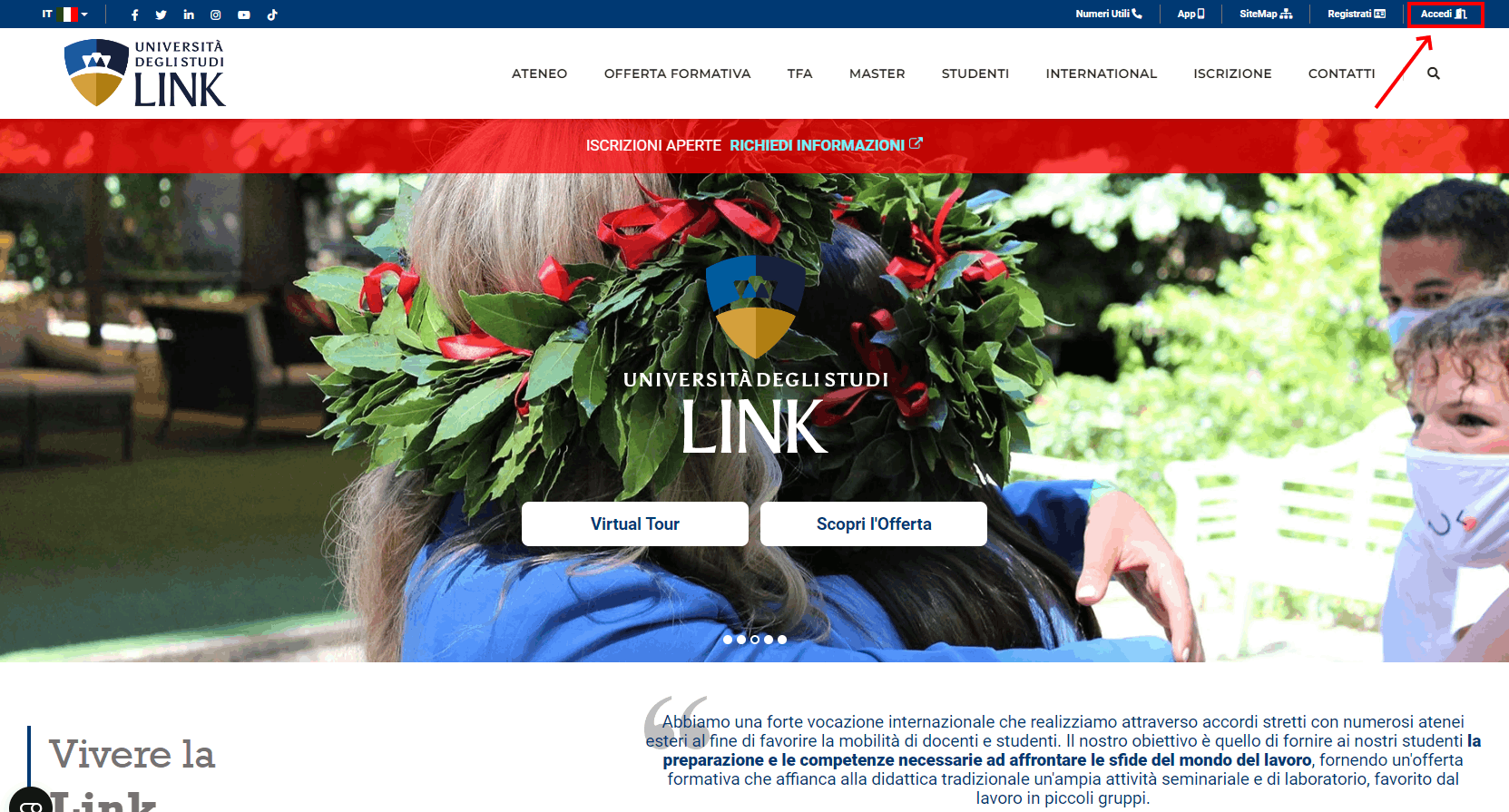
STEP 9 - In the following screen click on the "Change Password" button.
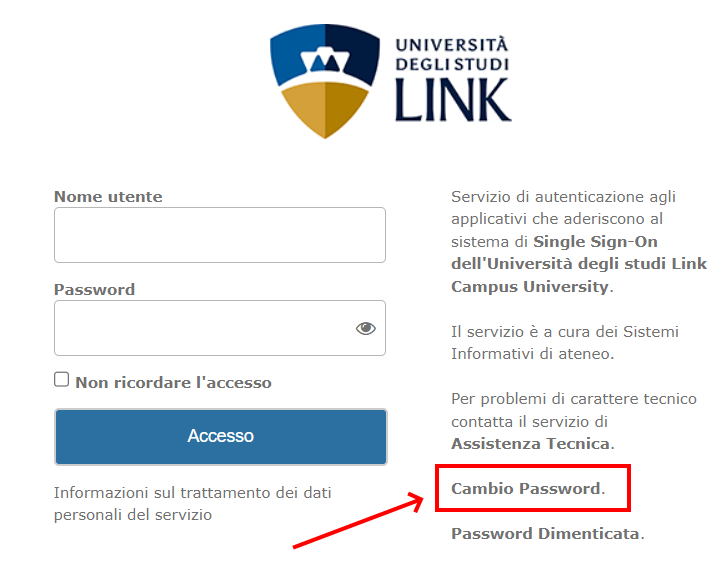
STEP 10 - Enter the previously provided credentials and create a new password. Then click on the "Modify" button.
SECOND PHASE: REGISTRATION FOR THE ADMISSION TEST
![]() Guidelines - procedure of registration to the admission test - Healthcare Professions
Guidelines - procedure of registration to the admission test - Healthcare Professions
STEP 1 - Now you can login to the reserved area (ACCESS TO THE RESERVED AREA).
STEP 2 - Enter the access credentials with the newly changed password.
STEP 3 - Click on the the side menu item "Access to the admission procedure to the Degree Courses"».
STEP 4 - Click on the "Login" button.
STEP 5 - Click on the "MENU" icon at the top right.
STEP 6 - Click on the "Student Administration Office" button and then on "Admission Test" and follow the video instructions.
FOLLOW THE INSTRUCTIONS PROVIDED TO COMPLETE THE PROCEDURE.
